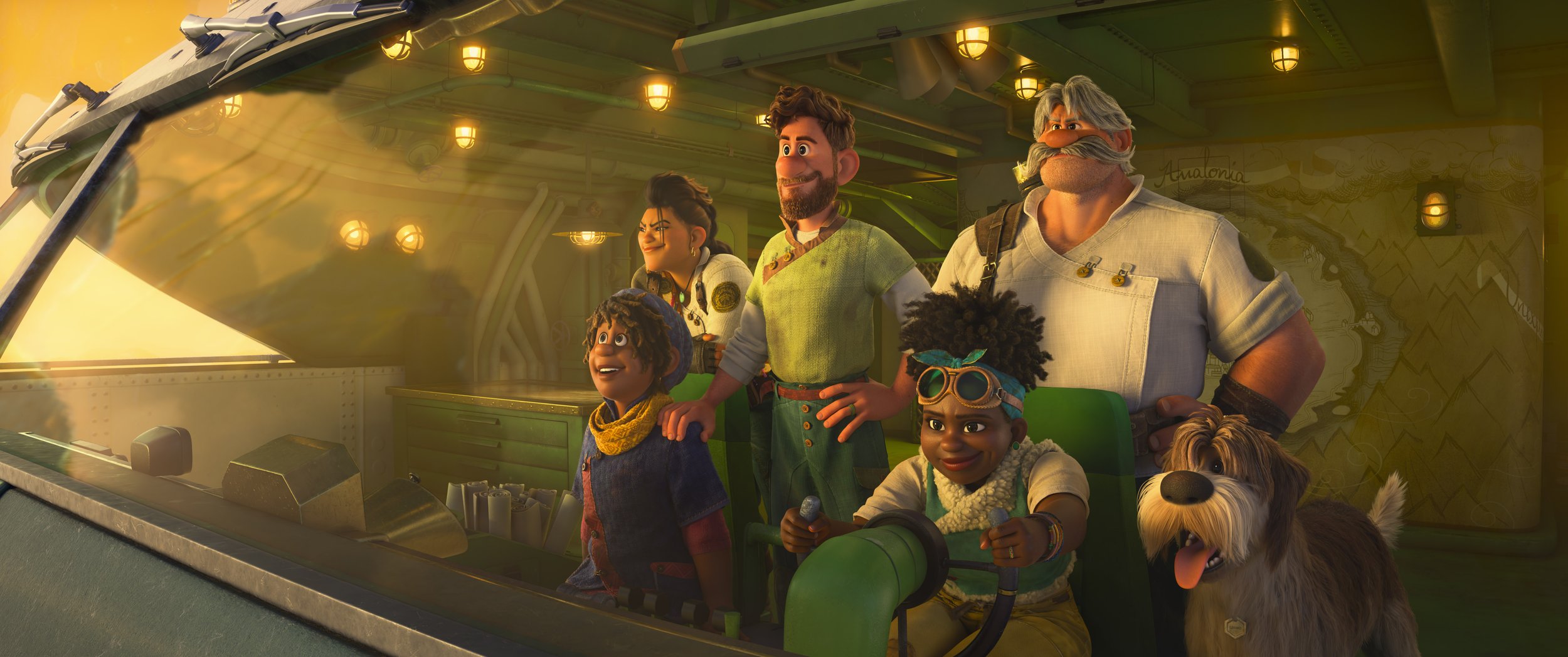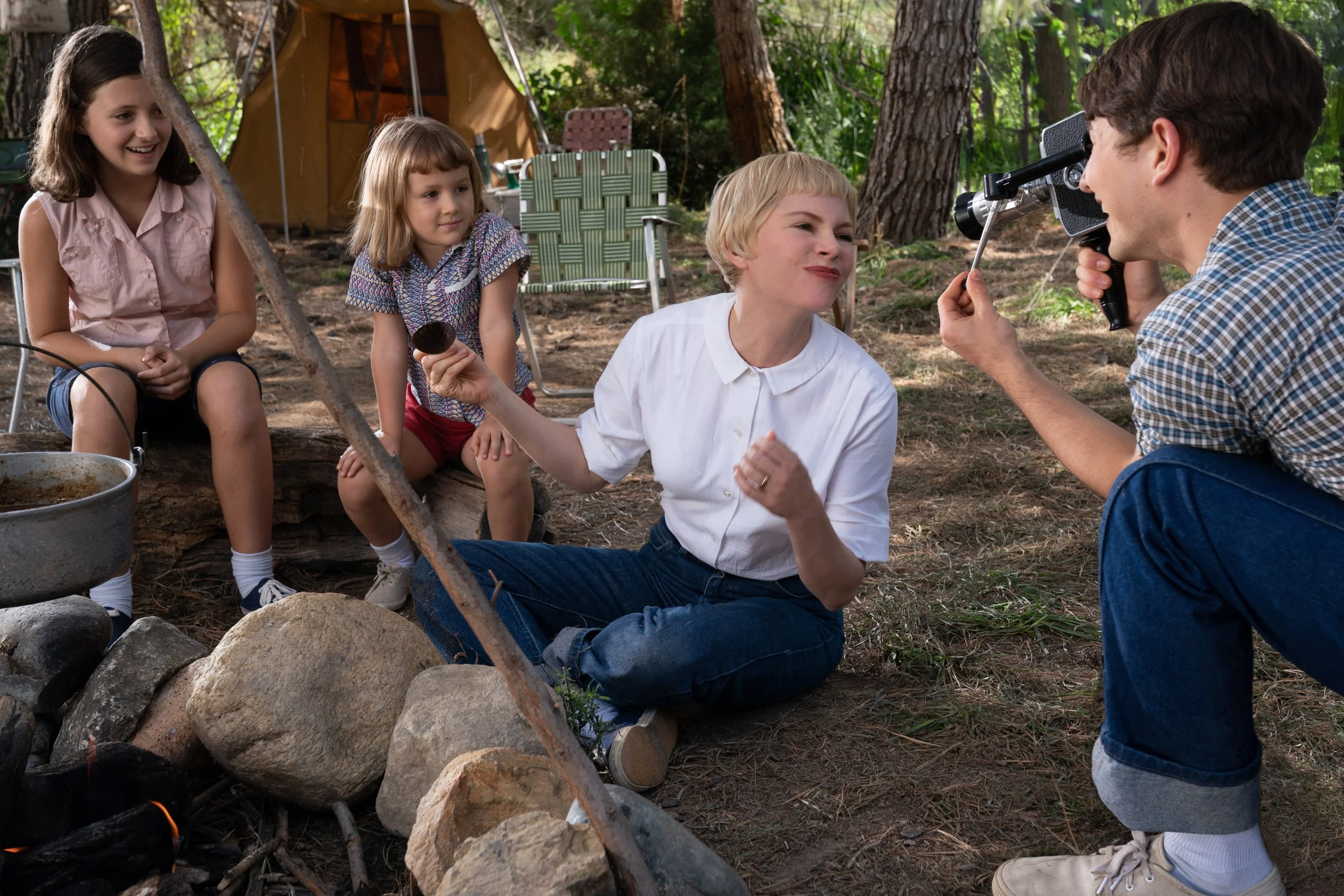FILM REVIEWS: Home Movies: Two Films Open for Thanksgiving – one great, one meh… and you won’t believe which is which
By Arnold Wayne Jones
There are two things I love about the new animated adventure Strange World: First, it’s about a white farmer named Searcher Clade (Jake Gyllenhaal) living on a farm that grows seemingly organic, sustainable crops that are also a renewable energy source with his Black wife Meridian (Gabrielle Union) and mixed race, openly gay son Ethan (Jaboukie Young-White) – exactly the kind of progressive, welcoming family film that will piss off right-wingers. The second thing I love about it is, it is exactly the kind of progressive, welcoming family film that will piss off right-wingers. Haters will dismiss Strange World as “woke,” sniffing that it has an indoctrination agenda meant to normalize acceptance of differences … which is just the reason why it can be so exciting. It’s the very fact of its casualness towards tolerance – even Ethan’s man’s man grandfather Jaeger Clade (Dennis Quaid) doesn’t miss a beat embracing his grandson having a boyfriend – that shows an entire world of dramatic possibilities in a format (big-budget animated feature from Disney) that often steers clear of such cultural bright lines.
But if my only reason for swooning over this film were its social awareness, it wouldn’t be the multi=layered success it is. There’s also the beautiful design and artwork, the exciting and emotionally resonant plot, the thrilling score by Henry Jackman. Strange World triumphs across the board.
The story is roughly recognizable to Disney devotees. Jaeger is a legendary explorer who, despite his exploits, has never crossed the imposing mountains that surround the village of Avalonia and keep it isolated from the rest of the world. Jaeger sets off with his 16-year-old son Searcher to finally find a passage, but Searcher is more interested in the seemingly magically plant he discovers on his way – an electricity-producing pod called pando that will revolutionize life in Avalonia, making it a kind of postcard version of Wakanda. Jaeger, though, continues on the journey, disappearing and never returning.
Two decades later, Searcher has his own family and is heralded in town as the techno genius who made life better. But when all the pando crops begin to die off, an expedition including Searcher (with his family stowed away) embarks on a mission to find the source of the blight, quickly discovering an underground world that seems almost magic.
Of course, you know who they find alive in this world. Of course, you know that father-son dynamics will be dutifully explored across generations. Of course, it will be resolved heart-warmingly. (It is a Disney film, after all.)
I won’t say more, because the film is so unexpectedly delightful, it’s great to go in knowing as little as possible and just being swept up in the adventure. It’s one of the few good films outside the Star Wars universe to use tons of wipe-edits and not seem clangy. Strange World is definitely another feast for the Thanksgiving holiday.
To my astonishment, I can’t say the same thing about The Fabelmans, Steven Spielberg’s long-awaited coming-of-age story. Spielberg deserves his reputation as one of cinema’s preeminent storytellers – a visual artist who knows how to tug heartstrings and who has portrayed childhood and adolescence with seriousness and respect. I expected The Fabelmans, based on his own life from about age five to 19, to have the same visual grandeur and intimate warmth as E.T. or Empire of the Sun. So it came as a shock to how often I sat puzzled, wondering about clunky scene transitions, heavy-handed and drawn out foreshadowing, awkward missteps and sketchy character development. It’s as if he was so close to the material, he didn’t have the perspective to do it justice.
It may also be because this is his first credited screenplay in 20 years… and only his fourth ever (he wrote or co-wrote Close Encounters, Poltergeist and A.I.). Even with Tony Kushner’s assistance, the story drones on for more than two-and-a-half hours, never developing any real momentum. And when it ends, it ends on such a sudden, gimmicky trope that, despite a quick chuckle, leaves you thinking, “C’mon… really?!”
The film begins in New Jersey at Christmas 1946 when Mitzi (Michelle Williams) and Bert (Paul Dano) take their young son Sam Fabelman to his first movie: The Greatest Show on Earth. Sammy becomes entranced by the magic of visual storytelling, which his artsy mother notices and his dull but loving dad supports. Dad’s foresight about the potential of computers gets him a new job in Arizona, and later, another in Northern California, which uproots the family, causing anxiety for Mitzi and leading a now teen-aged Sam (Gabriel LaBelle) to an unwelcome realization about his parents and their friend Benny (Seth Rogen). The plot meanders as coming-of-age stories often do, but without any real energy until a jolt about an hour in when Mitzi’s Uncle Boris (Judd Hirsch) shows up. Hirsch’s extended cameo is like a shovelful of coal in the locomotive engine powering the story, but it doesn’t sustain the film; it is not until the closing minutes when another cameo (played by filmmaker David Lynch) defibrillates a by-now listless body of routine bullying, failed romance and confessional revelations.
I wanted to like The Fabelmans, and truth is, I didn’t hate it, but it feels like it could have been made by anyone. The only indication that it shows us Spielberg is the main character’s preoccupation with making movies. There’s otherwise no clever foreshadowing (a joke about sharks? A quip about aliens from outer space?) that lets us know that Spielberg really appreciates his own legacy. That leaves the film in the realm of home movie rather than biographically insightful memoir. I’m more interested in the Clades than the Fabelmans, and who thought they’d hear that this Thanksgiving?
Both in wide release Thursday.



